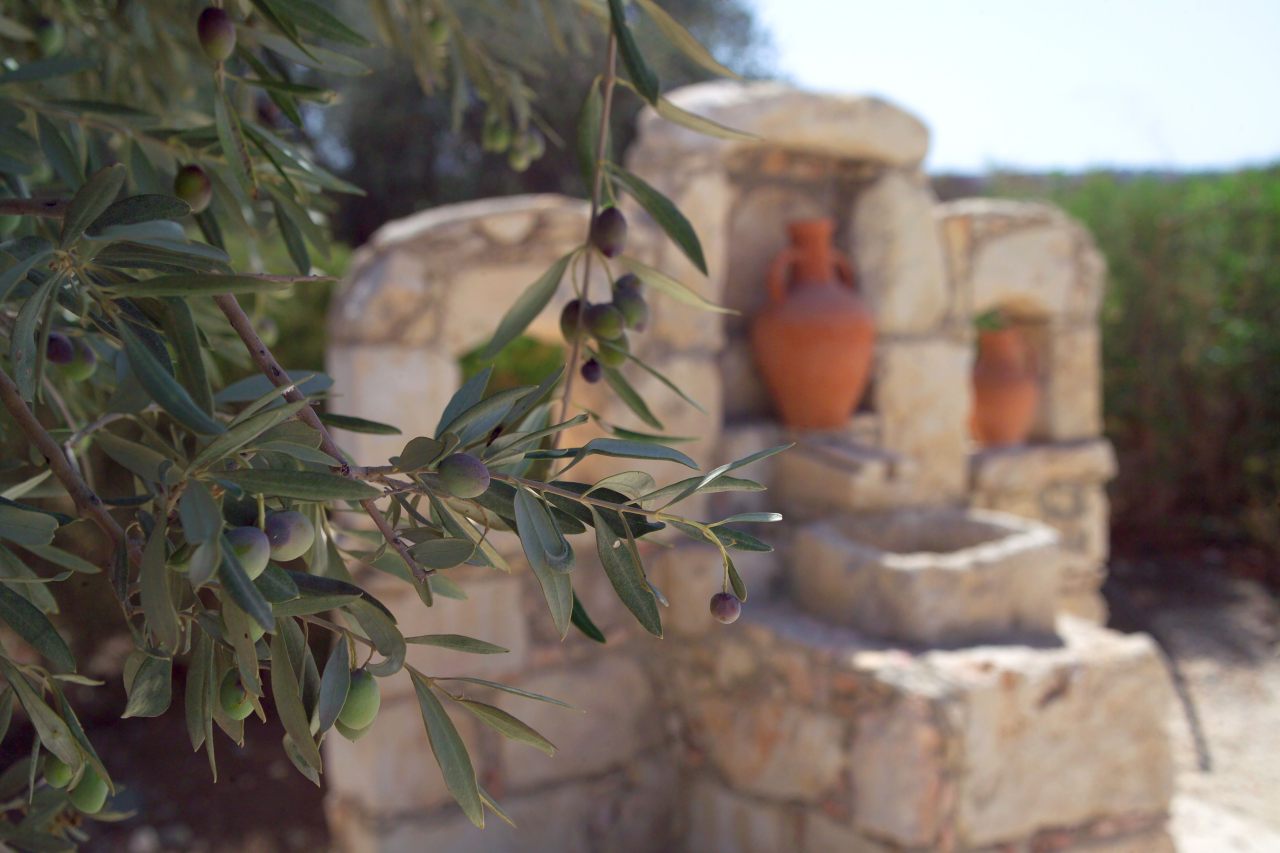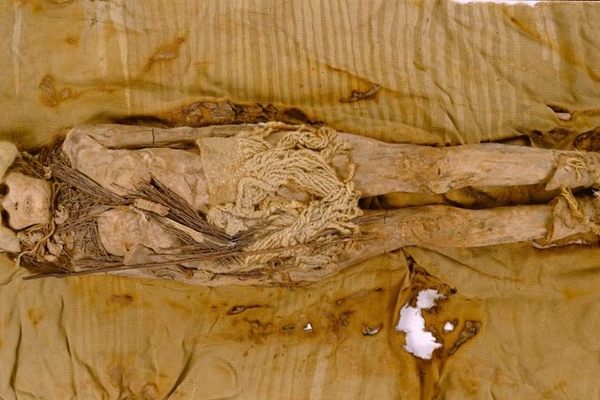Resurrecting the Scents of Ancient Cyprus
An experimental archaeology park lets visitors get a whiff of the island’s aromatic past.
Standing in the arid Mediterranean landscape, take a whiff from the tip of a clay gooseneck bottle. Notes of geranium and thyme hit your nose first, with hints of pine underneath, and then a lingering, complex herbaceousness.
To a trained nose, the smell may at first seem distinctly French, reminiscent of Francois Coty’s 1917 Chypre perfume, which became one of the most popular and celebrated scents of the 20th century. But the smell emanating from the bottle is much, much older. It’s reminiscent of the inspiration behind Chypre, dating back thousands of years, and originating over 1,500 miles from France.
![A variety of ancient, ornate perfume vessels have been found in Cyprus. The bottle of a female figure dates back to around 550 B.C. [left], while the glass one is more recent, dating back to the second or third century [right].](https://img.atlasobscura.com/9ugsSNZRLRqGOi-BhInvjdvijyWtEyxPZRI26eWnEko/rt:fill/w:1200/el:1/q:81/sm:1/scp:1/ar:1/aHR0cHM6Ly9hdGxh/cy1kZXYuczMuYW1h/em9uYXdzLmNvbS91/cGxvYWRzL2Fzc2V0/cy83MTI3ZTliMi02/NDIwLTQ0ZjktOTdj/MC1kMmFjNTlhNGE1/ZTIwZmUzZGNjZTA4/OWJlZTYyMGNfRm90/b0pldCAoMTEpLmpw/Zw.jpg)
Perfumes based on herbs like rosemary, bergamot, and pine were developed on the island of Cyprus some 4,000 years ago, during the Bronze Age, and were prized across the Eastern Mediterranean. Today, Cypriot and aromatic plant enthusiast Phylaktis Lazarou is on a mission to recreate the original scents of Cyprus, celebrating the island’s unique role in the evolution of perfume. In late 2018, Lazarou opened the Cyprus Perfumery Theme Park, home to over 50 different aromatic plants. Sitting at the foot of the Troodos Mountains in the north of Cyprus, just outside the village of Korakou, the park attracts researchers and visitors from around the world who can visit the park to practice the ancient perfumery process themselves.
For Lazarou, creating and opening the perfume park was about celebrating both the island’s cultural heritage and his family’s own history of working with herbs and plant essences. Lazarou’s mother was a pharmaceutical herbalist, continuing the island’s millennia-old tradition of using potent herbs for medicinal purposes. Historically, perfume-making and herbal medicine have been intertwined on the island. Marjoram, for example, was described as one of the aromatic herbs used both in perfumery and for medicinal purposes in ancient Cyprus by Pliny the Elder, a Roman author, naturalist, and philosopher. He praised Cyprus as the home of “the most prized, aromatic” plants, including thyme, bergamot, rock rose, and many more.

Cypriots—from nobility to the average citizen—have long appreciated and utilized the natural abundance of herbs. Much of what is known about this classical craft was unearthed by Italian archaeologist Maria Belgiorno and her team, who in 2003 discovered an ancient perfume-making factory in Pyrgos, which is an hour’s drive southeast of Lazarou’s park. It contained not only the original factory, but evidence of copper processing, medicine, and olive oil production. The high quality of olive oil on the island, or perhaps the way it was preserved during the perfumery process, is thought to be one of the key factors making Cyprus’ scents so sought after. “The king of Alasiya sent jars of sweet oil to the Egyptian pharaoh as diplomatic gifts, indicating the high value and esteem of Cypriot perfumed oils,” says perfume historian Alexandre Helwani.
While France may now be seen as the powerhouse of perfume, Lazarou seeks to remind the world of Cyprus’s ancient status. Being a lifelong lover of Cypriot aromatics, Lazarou opened the perfume park as a place to not only celebrate the past of perfumery, but bring it to life in the present. The perfume park is based on the methods of experimental archaeology, where activities replicate processes based on archaeological findings, teaching us more about the art form from the past.
![Phylaktis Lazarou [left], the founder and director of the Cyprus Perfumery Theme Park, tests out a variety of alembics [right] and other apparatuses used for making perfume of the past.](https://img.atlasobscura.com/HMzJMM7UGav4mpdqPiUYsgotId-cZZRVmFuWtD19s8k/rt:fill/w:1200/el:1/q:81/sm:1/scp:1/ar:1/aHR0cHM6Ly9hdGxh/cy1kZXYuczMuYW1h/em9uYXdzLmNvbS91/cGxvYWRzL2Fzc2V0/cy8yY2U4NjFhZi01/YzhjLTQ3ZjEtYjZk/ZS0yZDE3MjI4NGZj/ZDE1YTYyNWM5Zjg1/ZGNhYTQ5MjlfRm90/b0pldCAoMTIpLmpw/Zw.jpg)
For example, an apparatus called an alembic was found in the 2003 excavation. It was made of four clay pieces that fit together, resembling distillers still used in India today for the extraction of essential oils from herbs and flowers. To test if it could play the same role in ancient Cypriot perfumes, researchers at the park replicated the alembic and put it to the perfume-making test, and it worked! Today, they are continuing to explore other found pottery’s possible role in distillation and perfumery. The site is now scattered with various clay and bamboo replicas of ancient distillers placed over open fire, filling the air with sweet and herbal scents.
Belgiorno’s extraordinary discovery in Pyrgos brought the significance of Cyprus as an ancient perfume-making powerhouse to light. Lazarou’s park has made this glorious history accessible to anyone who’s interested. The park offers opportunities for visitors from around the world to try their hand at the ancient process. While they won’t smell exactly like the perfumes the ancients used, the concoctions bring visitors closer than ever before to a prized tradition that earned Cyprus its high status as a perfume producer in the ancient world.




















Follow us on Twitter to get the latest on the world's hidden wonders.
Like us on Facebook to get the latest on the world's hidden wonders.
Follow us on Twitter Like us on Facebook